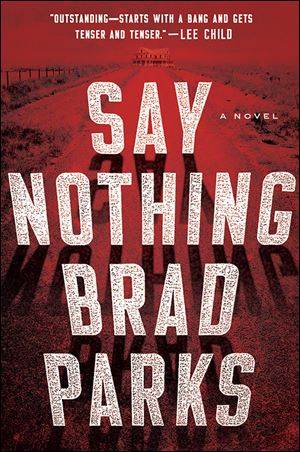
BOOK REVIEW
Parental love, pain guide novel ‘Say Nothing’
3/19/2017
Brad Parks
SARA HARRIS
Say Nothing, Brad Parks’ big, ambitious, sometimes troubling, always suspenseful new novel, portrays an American family besieged by evil. They’re the Sampsons — Scott and Alison, and their 6-year-old twins, Sam and Emma — who live in Norfolk, where he’s a federal judge and she works with disabled children. As the story begins, they’re about as happy a family as you’ll ever meet. Then everything changes.

Brad Parks
Scott has “the largest patent lawsuit in U.S. history” coming before his court. The case will decide the ownership of a new drug that will prevent many heart attacks and thereby earn billions of dollars for one side or the other. Then, after school one day, Sam and Emma are kidnapped, and Scott receives an anonymous message: Deliver the verdict we want or you will never see your children again. Chopping off fingers is part of the threat. “Say nothing,” the caller warns.

It’s a strong plot, and Parks makes the most of it. The horrified parents agree that they must not summon the police or FBI, because of the risk that the kidnappers will find out. Scott must go against his every instinct and serve not justice but whatever is needed to save his children. Most readers, particularly if they are parents, will cheer his decision.
We see the two foreign-born thugs, brothers, who are holding and sometimes abusing the twins. One of Alison’s worst fears is realized when these criminals feed the children peanut butter sandwiches — to which Emma is allergic. The captors find her on the floor, face red and blotchy, eyes swollen shut.
The ordeal extends for three weeks as various stages of the lawsuit unfold. Despite the parents’ vow of silence, Alison insists on telling her family — her mother, three sisters, and brothers-in-law — what has happened. As Scott feared, problems result. The pressures the parents face test their love, as each makes angry, unfair accusations against the other.
In court, the judge’s questionable rulings lead a publicity-seeking congressman to demand his impeachment. The judge comes to suspect that a member of his staff may be cooperating with the kidnappers. A man the judge secretly enlists for help vanishes. Although cruel and dangerous, the thugs holding the children are clearly not the brains of this billion-dollar crime — but who is?
Parks, a husband and father, writes well about the legal issues and political pressures that arise, but the novel’s great strength is his sensitive portrait of the parents’ love and pain. In one passage, the judge recalls, “I thought of how, when we first brought the twins home from the hospital, Alison and I used to creep into the nursery and watch them breathe. ... We wanted to make sure they were still doing it. But I think part of it was also to enjoy the unfathomable miracle we had conspired to create.”
Another time, Scott struggles to explain the emotions that overwhelm him: “The despair was followed by feelings of supreme impotence, soon to be replaced by rage, then heartaches, then hatred, then anxiety, then rage again.” Either parent would die to save the children, but the challenge is not that simple.
The author, a newspaper reporter before he turned to fiction, has an eye for colorful secondary characters. The plaintiff in the lawsuit, the eccentric chemist who claims to have invented the disputed drug, drives “an old station wagon that he converted to run on used vegetable oil, which he personally collected from restaurants.” (Such vehicles exist.)
We wait anxiously to learn who is behind the kidnapping and what fate will befall this family. That cannot be revealed here, but it can be said that the novel’s final pages are exciting, surprising and deeply moving. How moving? Its ending brought me to tears, and, where books are concerned, such moments are rare. Parks’ six novels about investigative reporter Carter Ross won crime-fiction prizes, but this stand-alone carries his work to a new level.